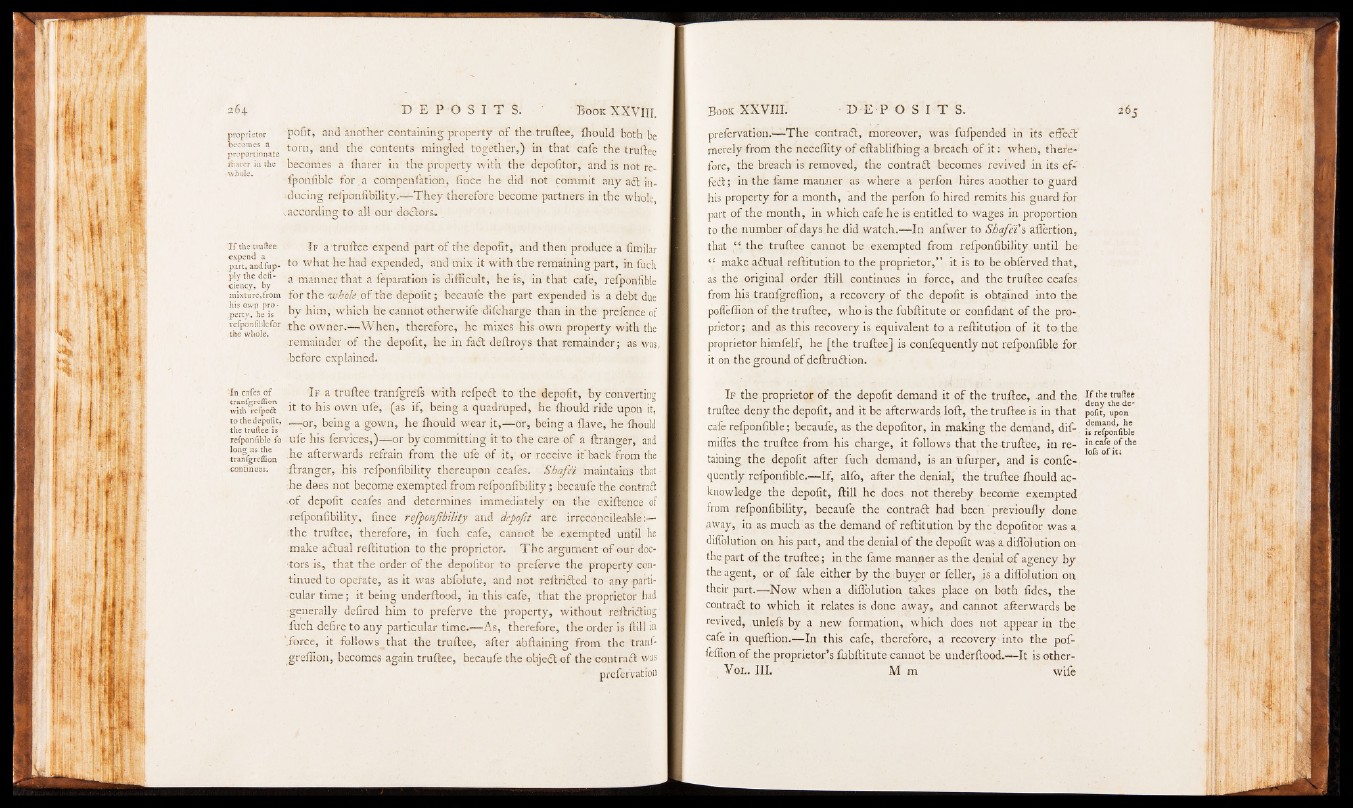
proprietor
becomes a
proportionate
inarer in the
•whole.
I f the'truftee
expend a
part, andfup-
ply the deficiency,
by
mixture, from
his own property,
he is
refponfiblefor
the whole.
In cafes o f
tranfgreflion
with refpedl
to thedepofit,
the truftee is
refponfible fo
long as the
tranfgreflion
continues.
pofit, and anotlier containing property of the-truftee, fhould both be
torn, and the contents mingled together,) in that cafe the truftee
becomes a fharer in the property with the depofitor, and is not refponfible
for.a compenfation, fince he did not commit any aft in-
ducing refponfibility.—They therefore become partners in the whole
-according to all our doftors.
If a truftee expend part of the depoftt, and then produce a fimilar
to what he had expended, and mix it with the remaining part, in fuch
a manner that a feparation is difficult, he is, in that cafe, refponfible
for the whole ^ of the depofit; becaufe the part expended is a debt due
by him, which he cannot otherwife difcharge than in the prefence of
the owner-—When, therefore, he mixes his-own property with the
remainder of the depofit, he .in faft deftroys that remainder; as was,
-before explained.
I f a truftee tranfgrels with refpeft 'to the depofit, by converting
it to his own ufe, (as if, being â quadruped, he fhould ride upon it,
—-or, being a gown, he fhould wear it,—Or-, being a flave, he fhould
ufe his fer-vices,)—or by committing it to the care of a Arranger, and
Jhe afterwards refrain from the ufe of it, or receive i f back from the
ffiranger., his refponfibility thereupon ceafes. Shafei maintains that ■
h e dees not become exempted from refponfibility ; becaufe the contract
-of depofit ceafes and determines immediately' on the : exi’ftenoe of ‘
refponfibility, fince refpottfibi'lity and 'depofit are irreconcileable :—
:the truftee, therefore, in fuch cafe, cannot be .exempted until he
make aftual reftitution to the proprietor. The argument of our doctors
is, that the order of the depofitor to preferve the property continued
to operate, as it was abfolute, and not reftrifted to any-particular
time ; it being underftood, in this cafe, that the proprietor had
generally defired him to preferve the property., without reftrifting.'
fuch defire to any particular time.—As, therefore, the order is ftill in
‘;force, it follows that the truftee, after abftaining from the tranf-
greffion, becomes again truftee, becaufe the objeft of the contraft was
prefervation
prefervation.— The contraft, moreover, was - fufpended in its effeft
merely from the neeeffity of eftablifhing a breach of it: when, therefore,
the breach is removed, the contraft becomes revived in its e f-1
ffeft ; in the fame manner as where a perfon hires another to guard
his property for a month, and the perfon fo hired remits his guard for
part of the month, in which cafe he is entitled to wages in proportion
to the number of days he did watch.— In anfwer to Shafei's aftertion,
that “ the truftee cannot be exempted from refponfibility until he
“ make àftual reftitution to the proprietor,” it is to be ohferved that,
as the .original order ftill continues in force, and the truftee ceafes
from his tranfgreflion, a recovery of the depofit is ohtgined into the
pofieffion of the truftee, w'ho is the fubftitute or confidant of the proprietor;
and as this recovery is equivalent to a reftitution of it to the
proprietor himfelf, he [the truftee] is confequently not refponfible for
it on the ground of deftruftion.
If the proprietor of the depofit demand it of the truftee, and the-
truftee deny the depofit, and it be afterward^ loft, the truftee is in that
cafe refponfible ; becaufe, as the depofitor, in making the demand, dif-
miffes the truftee from his charge, it follows that the truftee, in retaining
the depofit after fuch demand, is an ufurper, and is confequently
refponfible.— If, alfo, after the denial-, the truftee fhould acknowledge
the depofit, ftill he does not thereby beconte exempted
from refponfibility, becaufe the contraft had been previoufly done
away, in as much as the demand of reftitution by the depofitor was a
diflolution on his part, and the denial of the depofit was a difiolution on
the part of the. truftee ; in the fame manner as the denial of agency by
the agent, or o f fale either by the buyer or feller, is a difiolution on
their part.— Now when a difiolution takes place on both fides, the
contraft to which it relates is done away, and cannot afterwards be
revwed, unlefs by a new formation, which does not appear in the
cafe in quefüon.— In this cafe, therefore, a recovery- into the ppf-
feffion of the proprietor’s fubftitute cannot be underftood.— It is other-
V ol. III. M m wife
.If. the truflee
deny the de-
pofit, upon
demand, he
is refponfible
in cafe o f the
lofs o f it;